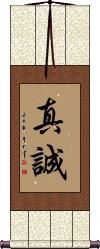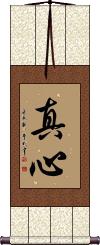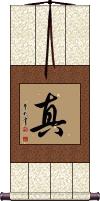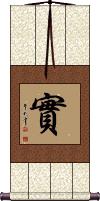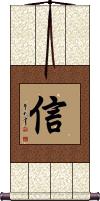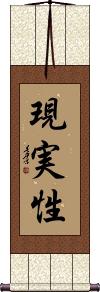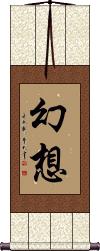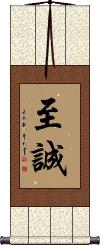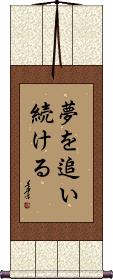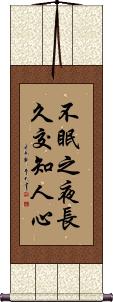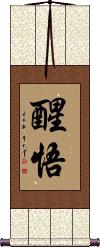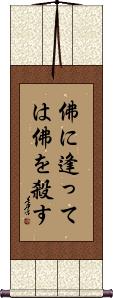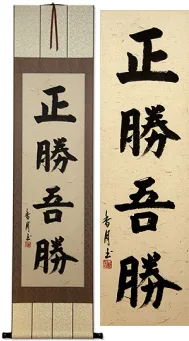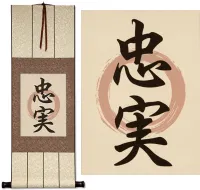Many custom options...
And formats...

True Idea in Chinese / Japanese...
Buy a True Idea calligraphy wall scroll here!
Personalize your custom “True Idea” project by clicking the button next to your favorite “True Idea” title below...
2. True Heart
4. Honesty
11. Only the sleepless know the length of night
12. Reality
Sincere / True Sincerity
真誠 is the true essence of sincerity.
It takes strength of personality to be truly sincere without overdoing it. Speaking of strength, this is probably the strongest way to convey the idea of sincerity in the Chinese language.
The first character literally means true, real, and genuine. While the second character means sincere and honest.
True Heart
While 真心 literally reads as “true heart” or “genuine heart,” the understood meaning is sincerity, devotion, sincere, or heartfelt. Some will extend the meaning to be like “true love.” It's the idea of doing something or treating someone with genuine feelings.
真心 is valid and has the same meaning in both Chinese characters and Japanese Kanji.
Note: While not too common, this can be the female given name “Mami” in Japanese.
True / Real / Genuine
真 is a simple way to express the idea that something is real, true, truth, or genuine.
Occasionally, this character refers to a Buddhist sect that originated in the 13th century.
真 is commonly used as a compound with other characters to create ideas like “true love.” It's also used similarly to the English words “really” or “truly” to say “really good” or “He is really knowledgeable.” Those phrases start with “他真的是... (note the second character is 真).
There are two ways to write this character, shown here is the most common way in China; however, a slight stroke variation is used in Korean Hanja. If you want that version, just let us know when you place your order.
See Also: Honesty
Honesty
Honesty / Fidelity
信 is another character that expresses the idea of honesty.
It can also mean truth, faith, belief in, fidelity, sincerity, trust, and/or confidence.
Some have included this in the list for the Bushido, although “makoto” is probably more common/popular.
Note: In some contexts, this character can mean a letter (mail), news, or envoy. However, alone, it will generally be read with the honesty-meaning.
See our page with just Code of the Samurai / Bushido here
See Also: Loyalty Trustworthiness Trustworthy
Reality / Realistic
現実性 is a Japanese word that expresses the idea of reality or coming to understand what is true and real.
This can also be translated as realistic, practical, or feasible.
See Also: Illusion
Fantasy / Illusion
幻想 is illusions or fantasy in Chinese, Japanese Kanji, and old Korean Hanja.
This can also refer to delusion or daydreaming. It sort of means a dream or idea that cannot be true or real ( at least not in this realm).
Sincerity and Devotion
至誠 is the idea that you enter into something with the utmost sincerity and fidelity. Ideas such as devotion, honesty, and “one's true heart” are also contained in this word.
至誠 is a universal word as the Chinese, Japanese Kanji, and Korean Hanja are all identical.
Ken Zen Ichi Nyo
拳禪一如 is a Japanese phrase that is often translated as “train both body and spirit.”
Here's the breakdown of the words in this phrase:
拳 means fist.
禅 is zen, which means meditation.
一如 is a word that means “to be just like,” “oneness,” “true nature,” or “true character.”
So to get to the translation of “train both body and spirit,” you must understand that “fist” is representing “body” and the idea of meditation is representing “mind.”
I have to say, this is not how I would translate this. To me, it's really about training with your mind and remembering that meditation is a huge part of training, not just your fist. As the Shaolin Buddhist monks show us, meditation is just as important as physical training in martial arts.
Pursue Your Dreams
夢を追い続ける is the Japanese way to express “pursue your dreams,” “follow your dreams,” or “chase your dreams.”
If you have dreams that you want to pursue and make true, this is the phrase for you.
The first character is “dream” or “dreams.” The rest of the characters establish the idea of chasing or pursuing.
Note: Because this selection contains some special Japanese Hiragana characters, it should be written by a Japanese calligrapher.
See Also: Pursuit of Happiness
Only the sleepless know the length of night
不眠之夜长久交知人心 literally translates as: [Only one who does] not sleep, learns how long the night is; [Only by] long acquaintance [does one] learn a person ['s true] character.
Basically, this proverb suggests that we really need to experience something intimately and for a long time to really know everything about it.
This can also be translated as “Spending years with someone is the only way to know them.”
Note: Sometimes this proverb is split into just the first or second idea alone (first 5 or last 5 characters only).
Reality
醒悟 is a Chinese word that expresses the idea of reality or coming to understand what is true and real.
The first character means to wake up, awaken, comprehend, introspect, or visit.
The second character means to comprehend or understand (be enlightened).
The meanings of Chinese words are not necessarily the sum of their parts. In this case, at best, you can derive that the characters express “understanding what is real” or “knowing what is real.” Any Chinese person will perceive this word in a similar way to how we use “reality” in English.
![]() Note: The first character can also be written in a different form as shown to the right. Same meaning in Chinese, either way
it’s
written.
Note: The first character can also be written in a different form as shown to the right. Same meaning in Chinese, either way
it’s
written.
Meet the Buddha, Kill the Buddha
This controversial Buddhist koan means “On encountering Buddha, you should kill him.”
This is the short concise Japanese version of an original statement by ninth-century Chinese Buddhist monk Linji Yixuan, “If You Meet The Buddha On The Road, Kill Him.”
This takes some explaining... The concept here is that if you think you have seen, experienced, or achieved true enlightenment, the chances that you really have are so slim that you should kill or dismiss that idea.
Another suggestion is that one's path to becoming a Buddha is one's own, and one should not get caught up in religious fervor, and avoid “showing off” that they are a Buddhist.
Helpful references for this concept:
Lion's Roar addresses "If You Meet The Buddha On The Road, Kill Him"
Kill the Buddha
Note: Because this selection contains some special Japanese Hiragana characters, it should be written by a Japanese calligrapher.
In Wine there is Truth
酒后吐真言 / 酒後吐真言 is a nice Asian proverb if you know a vintner or wine seller - or wine lover - although the actual meaning might not be exactly what you think or hope.
The literal meaning is that someone drinking wine is more likely to let the truth slip out. It can also be translated as “People speak their true feelings after drinking alcohol.”
It's long believed in many parts of Asia that one can not consciously hold up a facade of lies when getting drunk, and therefore the truth will come out with a few drinks.
I've had the experience where a Korean man would not trust me until I got drunk with him (I was trying to gain access to the black market in North Korea which is tough to do as an untrusted outsider) - so I think this idea is still well-practiced in many Asian countries.
Please note that there are two common ways to write the second character of this phrase. The way it's written will be left up to the mood of the calligrapher, unless you let us know that you have a certain preference.
This in-stock artwork might be what you are looking for, and ships right away...
Gallery Price: $200.00
Your Price: $122.88
Gallery Price: $200.00
Your Price: $122.88
Gallery Price: $90.00
Your Price: $49.88
The following table may be helpful for those studying Chinese or Japanese...
| Title | Characters | Romaji (Romanized Japanese) | Various forms of Romanized Chinese | |
| Sincere True Sincerity | 真誠 真诚 | zhēn chéng zhen1 cheng2 zhen cheng zhencheng | chen ch`eng chencheng chen cheng |
|
| True Heart | 真心 | mago koro / magokoro | zhēn xīn / zhen1 xin1 / zhen xin / zhenxin | chen hsin / chenhsin |
| True Real Genuine | 真 or 眞 真 | shin / makoto | zhēn / zhen1 / zhen | chen |
| Honesty | 實 实 | shí / shi2 / shi | shih | |
| Honesty Fidelity | 信 | shin | xìn / xin4 / xin | hsin |
| Reality Realistic | 現実性 | gen jitsu sei genjitsusei | ||
| Fantasy Illusion | 幻想 | gensou / genso | huàn xiǎng huan4 xiang3 huan xiang huanxiang | huan hsiang huanhsiang |
| Sincerity and Devotion | 至誠 至诚 | shisei | zhì chéng zhi4 cheng2 zhi cheng zhicheng | chih ch`eng chihcheng chih cheng |
| Ken Zen Ichi Nyo | 拳禪一如 拳禅一如 | ken zen ichi nyo kenzenichinyo | ||
| Pursue Your Dreams | 夢を追い続ける | yume wo oi tsudukeru yumewooitsudukeru | ||
| Only the sleepless know the length of night | 不眠之夜長久交知人心 不眠之夜长久交知人心 | bù mián zhī yè cháng jiǔ jiāo zhī rén xīn bu4 mian2 zhi1 ye4 chang2 jiu3 jiao1 zhi1 ren2 xin1 bu mian zhi ye chang jiu jiao zhi ren xin | pu mien chih yeh ch`ang chiu chiao chih jen hsin pu mien chih yeh chang chiu chiao chih jen hsin |
|
| Reality | 醒悟 / 省悟 醒悟 | xǐng wù / xing3 wu4 / xing wu / xingwu | hsing wu / hsingwu | |
| Meet the Buddha, Kill the Buddha | 佛に逢っては佛を殺す | butsu ni atte wa butsu o korosu | ||
| In Wine there is Truth | 酒后吐真言 / 酒後吐真言 酒后吐真言 | jiǔ hòu tǔ zhēn yán jiu3 hou4 tu3 zhen1 yan2 jiu hou tu zhen yan jiuhoutuzhenyan | chiu hou t`u chen yen chiuhoutuchenyen chiu hou tu chen yen |
|
| In some entries above you will see that characters have different versions above and below a line. In these cases, the characters above the line are Traditional Chinese, while the ones below are Simplified Chinese. | ||||
Successful Chinese Character and Japanese Kanji calligraphy searches within the last few hours...
